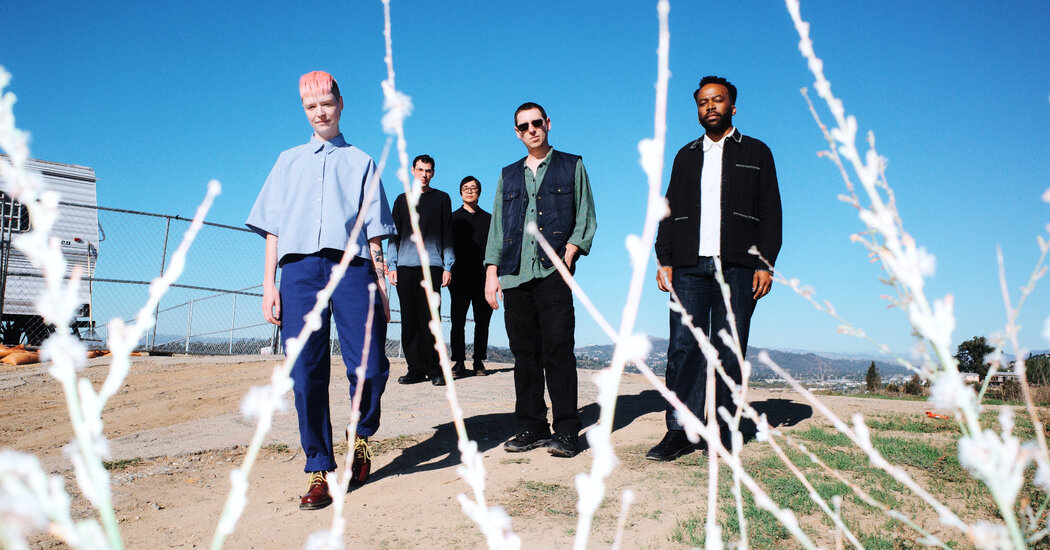SML had the promise of a record deal before it even had a name — or before all the members of the quintet had played together.
In mid-October 2022, the guitarist Gregory Uhlmann secured a two-night stand at ETA, a Highland Park cocktail bar that had become a hot spot for experimental jazz in Los Angeles. For the first night, Uhlmann recruited the saxophonist Josh Johnson and the electronics whiz Jeremiah Chiu, with whom he’d played just once. The next night, Johnson watched and listened as the bassist Anna Butterss and the drummer Booker Stardrum joined. They met only moments before cramming together inside the alcove where bands performed.
“The first thing I could think was, ‘I want to hear this in the club.’ I normally don’t have that reaction, but I could feel this in my loins,” Scott McNiece, who co-founded the label International Anthem in Chicago in 2014 before moving to Los Angeles in 2019, said during a video call. “But it was tickling me in my brain in the way that avant-garde music does, too. This was everything I wanted.”
Everyone who had been onstage those two days was busy, and not just with solo records and other ensembles. Butterss was playing with Madison Cunningham and Andrew Bird and would soon join Jason Isbell’s band. Johnson was finishing a long run as Leon Bridges’s music director, and Uhlmann was playing with Perfume Genius. Still, McNiece breathlessly told the players he would release those two sets as-is. They told him to wait. Six months later, the five musicians reconvened at ETA for two more nights, merging into a quintet.
They spent much of the next year editing those four shows into “Small Medium Large,” their 2024 debut that confounded notions of where jazz ended and electronica began, where the stage stopped and sampling started. “Usually the way it works is, you become friends with some people, make music with them for a while, and make a record,” Stardrum said from his shed studio near Kingston, N.Y. “But we’re getting to know each other now.”
Rather than rush into the studio to cut their second record, SML doubled down on this exploratory process for the absorbing “How You Been,” out Friday. The album combines fragments from six shows recorded in four cities, the music from the stage sometimes preserved but other times edited, manipulated and rearranged beyond recognition. Saxophone and guitar bleed into one another, while the rhythm section shifts between techno pulse and wobbly unpredictability.
Where Chiu often took the lead on their first album, all five members dug into the tapes here, frequently stunning each other with the bits of sound they could twist into new shapes. In three years, SML has become a dazzling studio jazz band that’s never actually been in a studio, using live recordings as the raw material for radical postproduction.
“From the jump, we saw the magic of being in the moment, then taking that and framing special moments on record,” Johnson said. “We don’t want endless choice, which can sometimes happen to five people trying to make a decision in a studio. This is, ‘Here’s what we did. Now, what do we want to do?’”
Though SML has been vital to a surge of enterprising jazz emerging from Los Angeles during the last decade, the quintet almost entirely comprises Midwest transplants. Chiu grew up in a suburb of Chicago, playing in punk bands with keyboards and learning to beat match in friends’ backyards. In Chicago’s Lincoln Park, Uhlmann was a teenage protégé of the DePaul University professor Bob Palmieri and the Tortoise guitarist and scene mainstay Jeff Parker, who became his teacher only after Uhlmann’s father approached Parker at a show, to the great embarrassment of his son.
Parker also occasionally taught Johnson, who had moved to Illinois from Maryland at 7 and became truly devoted to saxophone after his parents gave him a Lester Young CD for Christmas. Butterss, who uses they/them pronouns, grew up in Adelaide, Australia, playing flute in a family of Irish-music devotees. The first day Butterss held an upright bass in high school, they knew they wanted to come to the States and become a jazz musician. Butterss met Johnson while studying jazz at Indiana University in 2010.
Reared in a small town along the Hudson River by the composer and instrument innovator Dean Drummond and the flutist Stefani Starin, Stardrum is the only SML member without those Midwestern ties. By the time he arrived in California in 2017, though, SML’s other members were already there, gradually becoming immersed in the city’s experimental and improvisational enclaves. Parker, the Tortoise guitarist, had moved to L.A. and started performing every Monday night at ETA, and his residency became a musical magnet. Johnson and Butterss joined his band.
Chiu had moved to Los Angeles for better opportunities as a graphic designer, but when he encountered his fellow expatriates, he admired their dogged Midwestern ethos. He, for instance, had become fixated on Miles Davis’s electric bands, but he rarely encountered new jazz with synthesizers. SML became a way to rectify that.
“If I can’t find it, how do I make it happen?” Chiu said from his Los Angeles office, framed by stacks of synths. “That’s a very Chicago perspective: If it’s not there, let’s do it. If this thing’s happening a lot, we’ve got to do something else.”
Chiu commonly samples the rest of the group onstage by putting a microphone in front of a bandmate, feeding their sound into his circuits and spitting it back out. They don’t rehearse, and they very rarely discuss music in advance or dissect it afterward. All these strategies and dynamics, Butterss said, contribute to the “infinite challenge of being able to improvise.”
“I believe that, if we’re improvising genuinely, it’s not always going to be good. It can’t always be good, because you have to push through the bad stuff,” they said. “That is a really important part of growth.”
It’s also key to how SML makes records. As the members listen back to live recordings, they may spot compelling bits of sound from moments that felt listless, then sculpt them into unexpected pieces like an electronic producer. Chiu recalled hearing the “How You Been” opener “Gutteral Utterance,” which suggests Four Tet navigating a house of mirrors, and wondering how Johnson had done it. “What in the world are these sounds?” Chiu said, laughing. “But that’s my favorite part: not knowing.”
During a recent Friday afternoon video call, the five members of SML were scattered between three states. Butterss was in Nashville, about to begin the last weekend of a Ryman Auditorium residency with Isbell. Stardrum was in New York, while Chiu, Johnson and Uhlmann were at home in Los Angeles.
They struggled to recall the last time they’d been together. Uhlmann had missed a show when he was sick, so maybe, they finally agreed, it had been a photo session. The logistics of rendezvousing didn’t sound frustrating; the possibility of what could happen when they finally did sounded intoxicating.
“I get fatigued from playing a set 20 times the exact same way. This is always different,” Uhlmann said. “The most fun part of SML is you can’t tell who’s doing what. We’re not playing our instruments the way you’re supposed to play them: Is that Jeremiah? Is that Josh? That’s what gets me excited about improvising — when it’s surprising.”
The post How Does SML Make Experimental Jazz Albums? Very Unconventionally. appeared first on New York Times.




